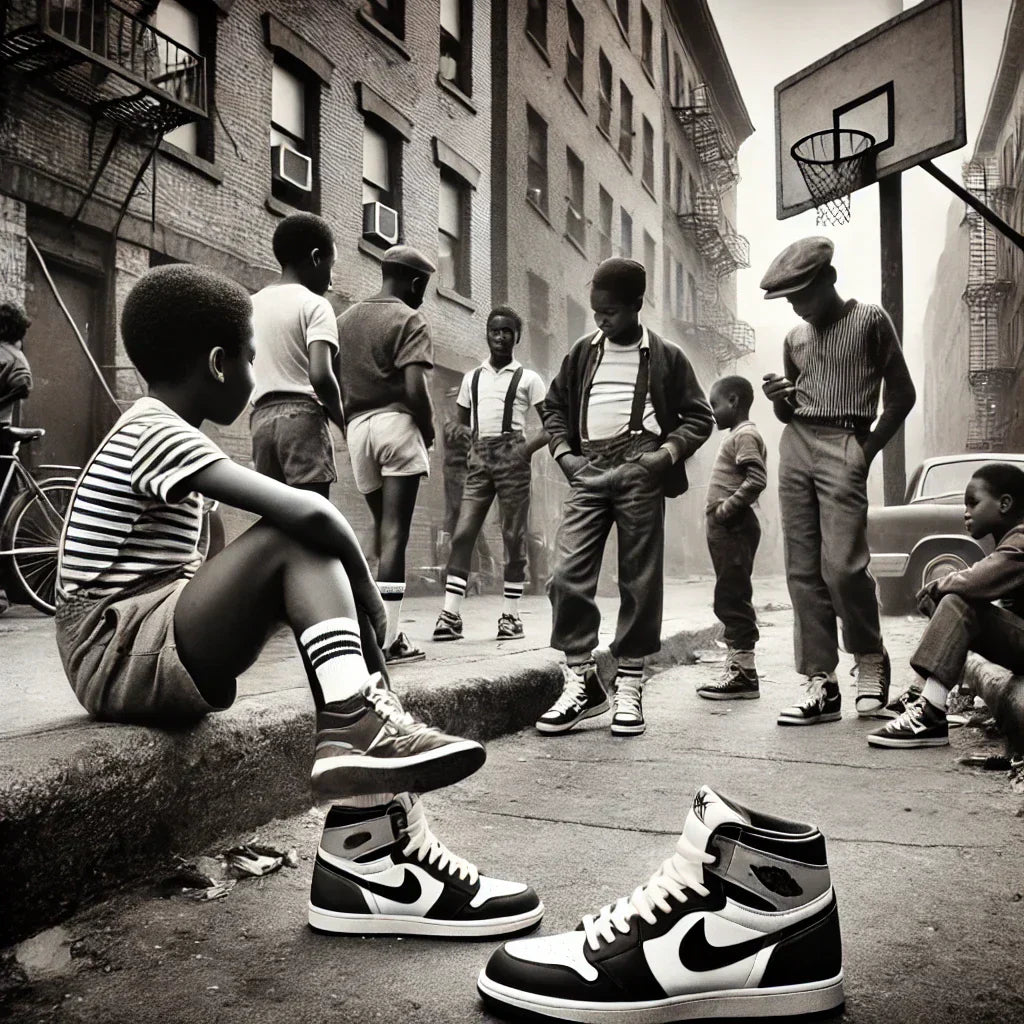
Stepping in History: Celebrating Black Influence in Sneaker Culture
Share
In 1986, when Run-DMC released "My Adidas," they weren't just dropping another track—they were documenting a cultural revolution. The song, a love letter to their favorite footwear, would lead to the first non-athletic endorsement deal in sneaker history, worth $1 million. This watershed moment perfectly encapsulates how Black culture has transformed sneakers from mere athletic gear into powerful symbols of identity, innovation, and social change.
The impact of Black communities on sneaker culture is staggering: by 2023, the global sneaker market reached $100 billion, with styles and trends predominantly shaped by Black cultural influences. This isn't just about fashion—it's about how a community turned footwear into a canvas for storytelling, resistance, and celebration.
The Roots Run Deep

The story begins in the mid-20th century, as sneakers transitioned from purely functional athletic wear to cultural symbols. In urban centers across America, particularly during the Great Migration, Black communities began infusing these everyday items with new meaning. Community centers, basketball courts, and street corners became incubators for style innovation, where sneakers weren't just worn—they were transformed.
During the Civil Rights Movement, style became a form of resistance. As James Baldwin noted, "Your crown has been bought and paid for. All you must do is put it on." For many in the Black community, sneakers became part of that crown—a way to walk with pride in a society that often denied their dignity.
When Music Met Footwear
The rise of hip-hop in the 1980s marked a pivotal moment in sneaker culture. Run-DMC's relationship with Adidas wasn't just a marketing triumph; it legitimized what Black youth had known for years—sneakers were more than footwear; they were a cultural touchstone. This intersection of music and fashion created a new language of style, where sneakers became lyrical subjects and status symbols simultaneously.
But no discussion of Black influence in sneaker culture would be complete without acknowledging Michael Jordan's seismic impact. When Nike launched the Air Jordan line in 1985, they weren't just creating a shoe—they were launching a cultural phenomenon. Jordan's influence transcended sports, making sneakers a cornerstone of Black fashion and entrepreneurship.
The Innovators and Visionaries
Today's sneaker culture continues to be shaped by Black visionaries. Designers like Virgil Abloh revolutionized the industry with his Off-White collaborations, bringing street culture to high fashion runways. Meanwhile, entrepreneurs like James Whitner, owner of The Whitaker Group, have created retail spaces that serve as community hubs, proving that sneaker culture can drive both economic and social change.
The DIY spirit remains strong in Black communities, where custom sneaker artists (like Dizzzykicks/myself) transform mass-produced shoes into one-of-a-kind statements. Local sneaker exchanges and community events continue to foster connections and creativity, maintaining the grassroots energy that has always powered sneaker culture.
Beyond the Hype
However, this cultural influence hasn't come without complexity. As major brands capitalize on Black cultural elements, questions of appropriation and authentic representation persist. The commercialization of sneaker culture presents a double-edged sword: while it has created opportunities for Black creators and entrepreneurs, it has also led to the commodification of cultural expressions that originated as forms of resistance and self-expression.
Social media has amplified Black voices in sneaker culture, with influencers and collectors sharing their perspectives and pushing the conversation forward. Platforms like Instagram and Twitter have become spaces where the community can celebrate its contributions, critique industry practices, and shape future trends.
The Road Ahead
The future of sneaker culture remains inextricably linked to Black innovation and creativity. Emerging designers are incorporating African textiles and patterns into their designs, while community organizations use sneaker culture as a vehicle for youth empowerment and education. Initiatives like the Black Sneaker Forum create spaces for celebrating this heritage while pushing the culture forward.
A Living Legacy
As we reflect on the profound influence of Black culture on the sneaker industry, it's clear that this is more than a fashion phenomenon—it's a testament to the power of cultural innovation and resilience. From Run-DMC to today's emerging designers, Black creators and communities continue to shape how we think about, wear, and celebrate sneakers.
For those looking to engage more deeply with this cultural legacy, consider:
- Supporting Black-owned sneaker boutiques and brands
- Following Black sneaker designers and influencers who are pushing the culture forward
- Participating in community events that celebrate sneaker culture's diversity
- Learning about the historical context that shaped today's sneaker landscape
The story of Black influence in sneaker culture isn't just history—it's a living, breathing narrative that continues to evolve. Every new design, every community event, and every young entrepreneur adds another chapter to this remarkable story of creativity, resistance, and triumph.
